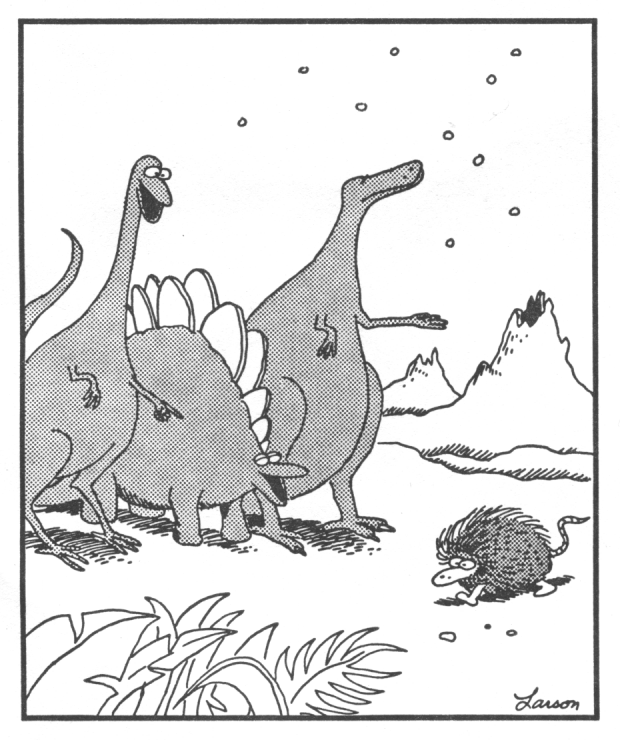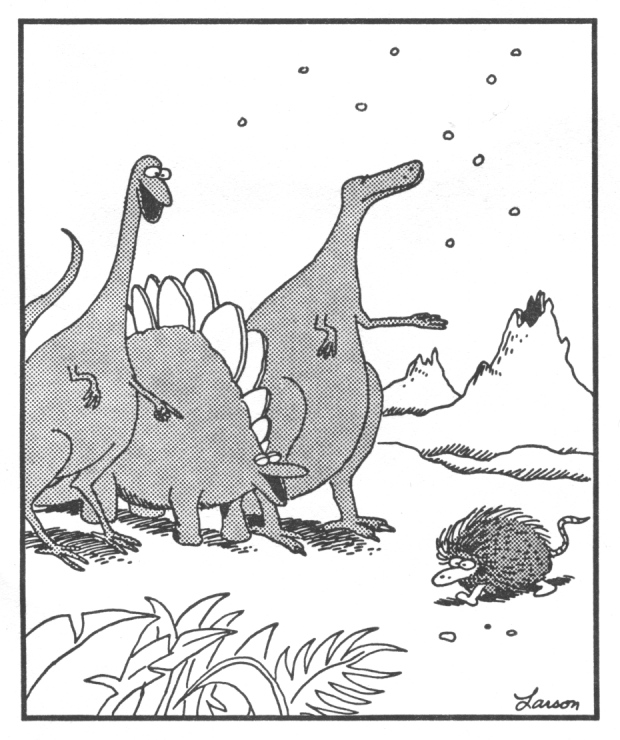The Trial of Padian[1]
We all remember that in our essays the etymology of the word, that of a “weighing” or “trial,”[2] is what emboldens this particular genre and gives it a sustaining appeal. In some sense, it is a meta-genre that encompasses any attempt to assess (see what I did there) ideas and bring the reader to a more thoughtful (or thought-filled) place. That said, I recall talking to my friend Kevin who recalled a story of his from the Late Cretaceous,[3] when he was heading to court to face trial. Angry House Republicans had subpoenaed all of the members of NCSE[4] to find out if they were obscuring justice by supporting the idea that humans were contributing to climate change. Along the way he meets a young teacher from Colorado.

LAR: Excuse me, do you know where the courthouse is? Oh, hello Dr. Padian.
KEV: Good to see you Larry, or perhaps not so good, if you are here for similar reasons as I.
LAR: Certainly you are bringing suit, for why would an esteemed scientist like you be taken to Federal court?
KEV: The Angry Republicans have accused us of unjustly riling up fear and corrupting the youth by publishing a paper that several high school teachers have been using to teach about climate change over geologic time.
LAR: Why, that is absurd! How can they bring such a ludicrous charge? I believe my case is far more reasonable. I am filing a suit against an American wholesaler that is partnered with a Japanese whaling company for I fear that whales are becoming extinct.
KEV: Ah extinction! There’s the rub! I am being accused of supporting scientists who write that we are in a sixth extinction and because of that people are in a panic and refuse to buy gasoline.
LAR: But extinction is happening at a background rate all the time, certainly this is not something to be afraid of.
KEV: I meant to say “mass extinction.”
LAR: Oh my!
KEV: Rare friend! It seems as though you really understand the ins and outs of this concept. I shall prepare for my trial by learning from your expertise! If the Republicans will not listen to me, then perhaps they will listen to you. I wish to know what is the nature of “extinction” and of “mass extinction,” if they are different concepts or not, and if we are really in a “mass extinction” right now.
LAR: Indeed, Kevin, these are good things to know before your trial.
KEV: And so, what is extinction, Larry?
LAR: An extinction is simply when the last member of a lineage dies.
KEV: But are not there different distinctions of extinction?
LAR: Perhaps you are talking about the difference between extinction and extirpation, or perhaps between background and mass extinction?
KEV: Certainly the latter! Everyone know that extirpation is just what oxymorons call “local extinction!”
LAR: Well when we talk about background extinction it is really a conversation about extinction rates and diversity. Usually we talk about how many times new lineages are originated and how many times lineages go extinct and we use these numbers to assess diversity in clades.
KEV: So I assume that when several clades lose diversity in a short period of time, that must be a mass extinction.
LAR: You’ve got it, Kevin!
KEV: But wait. Are there not different types of groups that can be considered clades? Certainly we’re not comparing families with species. And what is a “short” period of time? I feel like it’s been a long time since I last had a cup of coffee, oh, and is there a spatial component to this? Like does this mass extinction need to cover the entire Earth?
LAR: You’re right again, Kevin. We need to be more careful with our terms. I don’t believe there is a standard definition for mass extinction.
KEV: Well if there’s no definition that scientists can agree on, won’t people just be spinning their wheels? Because anyone can say, ‘no, you haven’t talked about ecological extent,’ or ‘I don’t agree with these paleontologists and their over-splitting.’
LAR: By Zeus, you’re right again, Kevin!
KEV: Maybe we should just forget the term altogether and use a term that we can actually define! It sounds like what we are talking about when we talk about mass extinctions really involves both origination and extinction. So mass extinctions are really diversity crises!
LAR: That’s a great way of thinking about it!
KEV: Now let’s try and define what we mean by “diversity crisis.” There’s two parts to a crisis, there’s before the crisis and after the crisis. So we’re comparing two things. We would need to find what are normal rates of origination and extinction for groups are and how changes to these rates are effecting diversity. So during a diversity crisis, groups will show a large excursion from the usual evolutionary rates.
LAR: Now that makes sense! I was always curious why out of the five widely accepted mass extinctions, err diversity crises, two of them had not much to do with changes in extinction rate. They were caused by drops in origination rates!
KEV: But what causes these crises?
LAR: Well, there are abiotic and biotic causes. Let me think of a few, well, I don’t think we’re imitating Aristotle here so I won’t give a long list, but the causes really boil down things changing in ways that affect life or should I say death, climate change and habitat changes to name a few.
KEV: It seems as though we now know what diversity crises are and the general causes of it. So, Larry, do you think that we’re in a diversity crisis right now?
LAR: Why, it seems as clear as day to me!
KEV: What makes you think that?
LAR: I read a great article in the New Yorker about it![5] It won the writer a Pulitzer. I remember a quote from her: “CO2 is a paleontologist’s dream.” She was interviewing a scientist that said that the role of CO2 in killing things either by ocean acidification or global warming is really significant and that humans are changing levels of CO2 at rates orders of magnitude faster than normal.
KEV: While it is good to read the New Yorker, I wonder, does her piece reflect the general scientific opinion?
LAR: It seems to me that the jury is out. I am a total nerd, so I can recall just reading a paper by Barnosky and colleagues (2011) in Nature where they review how mass extinctions are assessed and come to the conclusion that we could be in the beginning of another. If we keep up the current extinction rates we could meet their criterion for a mass extinction in 500,000 years.
KEV: And how did they arrive at such a conclusion?
LAR: They took the previous five mass extinctions and defined mass extinction as changes in extinction rate that are akin to the “Big Five.” They came up with a definition of mass extinction that essentially amounted to over 75 per cent of species dying over a geologically short time period of around two million years.
KEV: That seems fishy to me. So you’re telling me they don’t talk about origination rates at all?
LAR: Only in passing.
KEV: So we don’t even know how the diversity changes in that time! The problems we talked earlier about with regard to definitions are so clear now. Unless we know the rates of origination, how can we talk of diversity dynamics, which I believe is at the heart of why we study such things.
LAR: Absolutely, Socrates, err, I mean Kevin. But perhaps we are taking our definition too seriously. I say this because I recall a famous paper of Raup and Sepkoski’s (1982) that defined five mass extinctions in the marine fossil record and they also did not talk about the origination rate.
KEV: Just because famous scientists did things like that in the Middle Ages, does not mean that it’s the best way of thinking about things. Likewise, there are several problems with what Barnosky and friends are comparing. You mentioned them talking about 75% of species dying, but it does not seem trivial to compare living diversity which is usually measured in terms of species, with diversity in the fossil record which tends to be compared using genera and families. Also the diversity of life that we see today isn’t necessarily what is going to be preserved in the fossil record. There’s also not necessarily a synchronous relationship between events in the sea and what’s going on terrestrially.
LAR: That is an excellent point, Kevin!
KEV: It is really a philosophical question when it comes down to it. Biology is an historical science. Mass extinctions or diversity crises happened and we define it in terms based on historical evidence derived from the consequences of it having happened. It is impossible to use definitions that describe past events to judge situations that are happening. We do not even know if these critters that are “critically endangered,” “endangered,” or “vulnerable” will even go extinct.
LAR: I am starting to see it now, Kevin. This question of a “sixth mass extinction” could even perhaps not be in the realm of science because how can we test these hypotheses to see if they are wrong or not. I took IB 160 and learned that scientists need to be able to test hypotheses.
KEV: This does not bode well for me! I will be found guilty in court if this is the case!
LAR: That’s not entirely true. There are testable hypotheses, when we break free of the traditional hand-waving calisthenics. I think that it is possible to refine our questions about diversity by looking at both extinction and origination rates. Likewise, though it might not be helpful to look at endangered species per se, increasing our knowledge of climatic and other abiotic and biotic changes in the previous mass extinctions and the present, could give us insight into whether the conditions are right for a diversity crisis.
KEV: I wonder if this is not dissimilar to an historian and a journalist. The historian can learn all about the patterns behind genocide and discern possible causes for the rise of regimes that might perpetrate it, but how does the journalist know whether a genocide is happening or not before it is too late and the genocide has happened? To compare dead bodies to dead bodies might not be the best thing to do. To test hypotheses about similarities in circumstance, political conditions, philosophy, regimes, can help to catch state actors in the act and perhaps prevent them from committing the crime.
LAR: This is all well and good, Kevin, but I must be off to my case.
KEV: That is too bad! I still feel as though we have not gotten to the bottom of diversity crises and now my time in court is soon approaching. How will I convince the Angry Republicans about an idea that is only now more complex and unresolved as before?
[1] Yes, this will be a Euthyphro pastiche.
[2] From exagium meaning “a balance” (as in scale) where the Old French word essai (“trial”) is derived. Schoolteachers might have you believe that the further derived French denominal essayer “to try” defines the spirit of the “essay,” but they would be mistaken.
[3] Actually, it was 2011.
[4] National Center for Science Education. See ncse.com
[5] See Kolbert, Elizabeth, “The Sixth Etinction?” in the New Yorker, May 25, 2009 Issue.


